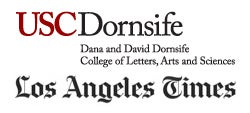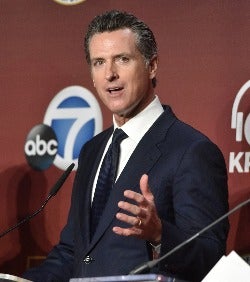The new federal tax legislation, passed less than six months ago, is already unpopular among Californians. Forty-seven percent of registered voters opposed the changes to the tax code, compared to 27 percent who supported it. By contrast, 6 out of 10 registered voters approve of the Affordable Care Act (ACA), known in the state as Covered California. That’s twice as many as those who oppose it.How members of Congress voted on both issues could determine whether some incumbents are re-elected.
“In tightly contested congressional districts, independent voters are going to be critical to determining who wins,” said Shrum. “They could prove decisive by voting against an incumbent who voted to get rid of the ACA or who voted for the Trump tax bill that takes away state and local tax deductions.”
A slight majority of all voters, and specifically independents, said they’re less likely to re-elect their member of Congress if he or she voted for the new tax law. Democrats were even more compelled; more than two-thirds said they would be less likely to reelect a representative who supported the tax legislation.
Opinions regarding congressional votes to end the ACA were just as strong.
Fifty-four percent of registered voters said that if their member of Congress voted to kill the healthcare legislation, they’re less likely to re-elect that member. Even in the region of southern California that includes San Diego, the Inland Empire and Orange County — home to some of the most competitive races for Congress — more voters were more likely to oppose a candidate who voted to end the ACA than to back them.
Senate race: Wide lead for Feinstein
hirty-two candidates are in the primary race for California’s open U.S. Senate seat, but incumbent Dianne Feinstein has a commanding lead — 31 percent among likely voters. Fellow Democrat, state Sen. Kevin de León, is in second place with 7 percent support. The leading GOP candidate, James P. Bradley, garnered only 3 percent.
California right, Trump wrong
Slightly more than half of all registered voters, 51 percent, think that things in the state are going in the right direction. That’s a 14 percentage point shift toward the “right direction” since November’s USC Dornsife/LA Times poll.
While there’s a huge gap between Democrats (61 percent) and Republicans (22 percent) who have such optimism, both groups — including Trump supporters — have shifted their opinions about California toward the “right direction” since November.
The president remains very unpopular. Nearly 7 in 10 registered voters disapprove of Donald Trump, an opinion that remains largely unchanged since the poll measured it last November.
###
View the results
The USC Dornsife/Los Angeles Times Poll is a partnership of the Los Angeles Times and two institutions of the USC Dornsife College of Letters, Arts and Sciences: The Jesse M. Unruh Institute of Politics and the Center for Economic and Social Research.
The survey, results and methodology are available at: https://dornsife.usc.edu/unruh/polls For more information about the Center for Economic and Social Research Understanding America Study internet panel, visit https://uasdata.usc.edu

 Trump’s approval rating remains low and largely unchanged from November, while a majority of all Californians and a growing number of people representing the diversity of the state — including Democrats, Republicans and even Trump supporters — think that things in California are going in the right direction.
Trump’s approval rating remains low and largely unchanged from November, while a majority of all Californians and a growing number of people representing the diversity of the state — including Democrats, Republicans and even Trump supporters — think that things in California are going in the right direction. Lt. Gov. Gavin Newsom has a double-digit lead over other gubernatorial candidates less than two weeks before the June 5 primary, according to a new USC Dornsife/Los Angeles Times poll of California voters.
Lt. Gov. Gavin Newsom has a double-digit lead over other gubernatorial candidates less than two weeks before the June 5 primary, according to a new USC Dornsife/Los Angeles Times poll of California voters.